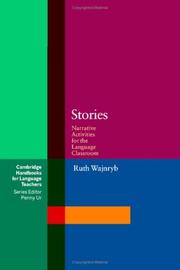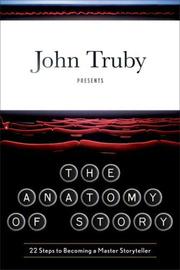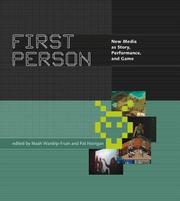| Listing 1 - 6 of 6 |
Sort by
|

ISBN: 0521001609 Year: 2005 Publisher: Cambridge Cambridge University Press
Abstract | Keywords | Export | Availability | Bookmark
 Loading...
Loading...Choose an application
- Reference Manager
- EndNote
- RefWorks (Direct export to RefWorks)
Didactics of English --- #KVHA:Taalonderwijs; Engels --- #KVHA:Vereniging Vlaamse Leerkrachten Engels --- Oral interpretation of fiction --- technisch Engels --- talenonderwijs --- creatief taalgebruik --- English language --- -Narration (Rhetoric) --- Storytelling --- Story-telling --- Telling of stories --- Oral interpretation --- Children's stories --- Folklore --- Germanic languages --- Narrative (Rhetoric) --- Narrative writing --- Rhetoric --- Discourse analysis, Narrative --- Narratees (Rhetoric) --- Study and teaching --- -Foreign speakers --- Performance

ISBN: 9780865479517 0865479518 9780865479937 0865479933 Publisher: New York, N.Y. Faber and Faber
Abstract | Keywords | Export | Availability | Bookmark
 Loading...
Loading...Choose an application
- Reference Manager
- EndNote
- RefWorks (Direct export to RefWorks)
"John Truby is one of the most respected and sought-after story consultants in the film industry, and his students have gone on to pen some of Hollywood's most successful films, including Sleepless in Seattle, Scream, and Shrek. The Anatomy of Story is his long-awaited first book, and in it he shares all his secrets for writing a compelling script. Based on the lessons in his class, Great Screenwriting, The Anatomy of Story draws on a broad range of concepts and archetypes from philosophy and mythology, offering techniques and anecdotes alongside Truby's own unique approach to building an effective, multifaceted narrative." "Truby's method of constructing a story is at once perceptive and practical, focusing on the hero's moral and emotional growth. Writers will dig deep within and explore their own values and worldview in order to create an effective story. They will come away with a precise set of tools to employ - specific techniques to make the audience care about their characters. They will learn how to make their characters grow in meaningful ways, how to construct surprising plots that are unique to their particular concepts, and how to express a moral vision that can move an audience." "The foundations of story that Truby lays out are so fundamental that they are applicable - and essential - to all writers, from novelists and short story writers to journalists, memoirists, and writers of narrative nonfiction."--Jacket.
Storytelling. --- film --- narratologie --- literatuur --- 791.44 --- scenario's --- Story-telling --- Telling of stories --- screenplays --- verhaalaspecten --- Storytelling --- Oral interpretation --- Children's stories --- Folklore --- Oral interpretation of fiction --- Performance --- Film --- creatief schrijven --- 798.63 --- scenario --- scenarioschrijven --- script --- storytelling --- film, scenario --- 765.40 --- Creatie en productie - Schrijven --- 764.20 --- Theorie van het theater en de film - Creatie - Schrijven --- writing [processes]

ISBN: 0262232324 9780262731751 9780262232326 0262731754 Year: 2004 Publisher: Cambridge, Mass. MIT
Abstract | Keywords | Export | Availability | Bookmark
 Loading...
Loading...Choose an application
- Reference Manager
- EndNote
- RefWorks (Direct export to RefWorks)
Electronic games have established a huge international market, significantly outselling non-digital games; people spend more money on The Sims than on "Monopoly" or even on "Magic: the Gathering." Yet it is widely believed that the market for electronic literature -- predicted by some to be the future of the written word -- languishes. Even bestselling author Stephen King achieved disappointing results with his online publication of "Riding the Bullet" and "The Plant."Isn't it possible, though, that many hugely successful computer games -- those that depend on or at least utilize storytelling conventions of narrative, character, and theme -- can be seen as examples of electronic literature? And isn't it likely that the truly significant new forms of electronic literature will prove to be (like games) so deeply interactive and procedural that it would be impossible to present them as paper-like "e-books"? The editors of First Person have gathered a remarkably diverse group of new media theorists and practitioners to consider the relationship between "story" and "game," as well as the new kinds of artistic creation (literary, performative, playful) that have become possible in the digital environment. This landmark collection is organized as a series of discussions among creators and theorists; each section includes three presentations, with each presentation followed by two responses. Topics considered range from "Cyberdrama" to "Ludology" (the study of games), to "The Pixel/The Line" to "Beyond Chat." The conversational structure inspired contributors to revise, update, and expand their presentations as they prepared them for the book, and the panel discussions have overflowed into a First Person web site.
Computer. Automation --- Sociology of culture --- Crumpton, Michael --- kunst --- literatuur --- kunst en technologie --- nieuwe media --- computers --- internet --- game design --- narratologie --- cybercultuur --- virtual reality --- computerspellen --- hypertekst --- 791.5 --- 82 --- Electronic games --- Social aspects. --- Cyberculture. --- 2ram --- Electronic toys --- Games --- Social aspects --- Jeux vidéo --- Réalité virtuelle --- Thèmes, motifs --- Réalité virtuelle. --- Electronic books. --- Electronic games. --- Story-telling --- Data processing. --- Video games --- Computer games --- Internet games --- Television games --- Videogames --- Jeux vidéo --- Réalité virtuelle. --- Thèmes, motifs
Book
Abstract | Keywords | Export | Availability | Bookmark
 Loading...
Loading...Choose an application
- Reference Manager
- EndNote
- RefWorks (Direct export to RefWorks)
Met welke apps en tools giet je verhalen in een straffe vorm? Hoe maak je een grondplan voor een transmediaal verhaal? Waarom is 'transmedia-' niet hetzelfde als 'multimedia-', 'deep media-' of 'klassieke storytelling'?De verhalen van vandaag beleef je langs verschillende kanalen tegelijk. 'Be the story' vertelt je alles wat je moet weten over deze nieuwste vorm van verhalen vertellen. Je komt te weten waarom transmedia zo nauw verbonden is met moderne technologie. En hoe je ook met je smartphone geweldige content maakt. In een constant bewegend en exploderend medialandschap geeft dit boek je alle tips om kijkers en gebruikers continu geprikkeld te houden.https://www.lannoo.be/nl/be-story
Transmedia --- Internet en journalistiek --- Media ; storytelling. --- Journalism --- journalistieke technieken --- storytelling --- journalistiek --- civiele journalistiek --- #KVHA:Meertalige communicatie --- #KVHA: Storytelling --- #KVHA:Digitale media --- #SBIB:309H1020 --- #SBIB:309H519 --- #SBIB:309H1713 --- Mediaboodschappen: algemene werken (met inbegrip van genres, taalgebruik en historiek) --- Praktische handleidingen i.v.m. schrijven en spreken --- Mediatechnologie: nieuwe toepassingen (abonnee-televisie, electronic mail, desk top publishing, virtuele realiteit...) --- Media --- Journalistiek --- Internet --- Content marketing --- Mediastrategieën --- Storytelling --- Technologische vooruitgang --- Audiovisuele media --- Verhalen --- marketing --- Contentmarketing --- Mediastrategie --- Verhaal --- Reizen --- Ziekte --- Vliegen (werkwoord) --- Technologie --- Digitale media --- social media --- verhalen --- internet --- 316.77 --- Social media --- 369.1 --- communicatie --- marketing, marktonderzoek, marktanalyse --- 670 --- communicatietechnologie --- informatica --- informatique --- Sociale media --- Story telling
Book
ISBN: 9781999675998 1999675991 9781838003982 1838003983 Year: 2019 Publisher: [S.l.] : Ignota,
Abstract | Keywords | Export | Availability | Bookmark
 Loading...
Loading...Choose an application
- Reference Manager
- EndNote
- RefWorks (Direct export to RefWorks)
In The Carrier Bag Theory of Fiction, visionary author Ursula K. Le Guin retells the story of human origin by redefining technology as a cultural carrier bag rather than a weapon of domination. Hacking the linear, progressive mode of the Techno-Heroic, the Carrier Bag Theory of human evolution proposes: 'before the tool that forces energy outward, we made the tool that brings energy home.' Prior to the preeminence of sticks, swords and the Hero's long, hard, killing tools, our ancestors' greatest invention was the container: the basket of wild oats, the medicine bundle, the net made of your own hair, the home, the shrine, the place that contains whatever is sacred. The recipient, the holder, the story. The bag of stars. This influential essay opens a portal to terra ignota: unknown lands where the possibilities of human experience and knowledge can be discovered anew. With a new introduction by Donna Haraway, the eminent cyberfeminist, author of the revolutionary A Cyborg Manifesto and most recently, Staying with the Trouble and Manifestly Haraway. With images by Lee Bul, a leading South Korean feminist artist who had a retrospective at London's Hayward Gallery in 2018.
Fiction --- Technology and civilization --- Human evolution --- Containers --- Culture --- Storytelling --- 130.2 --- cultuurfilosofie --- cultuurgeschiedenis --- evolutieleer --- technologie --- twintigste eeuw --- literatuur --- narratologie --- literatuurtheorie --- antispeciesisme --- scenario --- tekenkunst --- feminisme --- 741.071 --- Bul Lee --- Story-telling --- Telling of stories --- Oral interpretation --- Children's stories --- Folklore --- Oral interpretation of fiction --- Cultural sociology --- Sociology of culture --- Civilization --- Popular culture --- Cans --- Receptacles --- Implements, utensils, etc. --- Packaging --- Evolution (Biology) --- Physical anthropology --- Evolutionary psychology --- Human beings --- Civilization and machinery --- Civilization and technology --- Machinery and civilization --- Social history --- Technology --- Metafiction --- Novellas (Short novels) --- Novels --- Stories --- Literature --- Novelists --- Social aspects --- Performance --- Origin --- Philosophy --- History and criticism. --- Storytelling. --- Human evolution. --- Technology and civilization. --- Récipients --- Art de conter. --- Êtres humains --- Technologie et civilisation. --- Social aspects. --- Aspect social. --- Évolution.
Book
ISBN: 9033406632 9789033406638 Year: 1983 Publisher: Leuven: Acco,
Abstract | Keywords | Export | Availability | Bookmark
 Loading...
Loading...Choose an application
- Reference Manager
- EndNote
- RefWorks (Direct export to RefWorks)
Children --- -Children --- -Children's literature, Dutch --- -Dutch children's literature --- Dutch literature --- Childhood --- Kids (Children) --- Pedology (Child study) --- Youngsters --- Age groups --- Families --- Life cycle, Human --- Books and reading --- History and criticism --- Activity programs in education. --- Children's literature, Dutch --- Storytelling. --- Pedagogiek en onderwijskunde --- History and criticism. --- didactische principes --- -Books and reading --- didactische principes. --- vertellen --- therapie --- voorlezen --- jeugdliteratuur --- kleuteronderwijs --- Didactics of Kindergarten --- leesbevordering --- Psychological study of literature --- didactiek --- Didactics of languages --- Didactische principes. --- 433.7 ) Activiteiten met het jeugdboek --- voorlezers --- Jeugdliteratuur: vertellen --- Activity schools --- Creative activities and seat work --- Project method in teaching --- Oral interpretation of fiction --- -Activiteiten met het jeugdboek --- Activity programs --- Didactics of Dutch --- Activity programs in education --- Storytelling --- basisonderwijs --- voorleesboeken --- voorleesverhalen --- 433.75 --- 471.41 --- 475.26 --- Basisonderwijs --- Jeugdliteratuur --- Kleuteronderwijs (Voorschoolse educatie) --- Leesbevordering --- Prentenboeken --- Vertellen --- Voorlezen --- #gsdbP --- Education --- Story-telling --- Telling of stories --- Oral interpretation --- Children's stories --- Folklore --- Activiteiten met het jeugdboek --- Taal en verbale expressie --- Lezen --- Experimental methods --- Performance --- Lerarenopleiding --- (vak)didactiek talen. --- Children's literature, Dutch - History and criticism --- Children - Books and reading - Netherlands --- Children - Books and reading - Belgium --- Jeugd
| Listing 1 - 6 of 6 |
Sort by
|

 Search
Search Feedback
Feedback About UniCat
About UniCat  Help
Help News
News